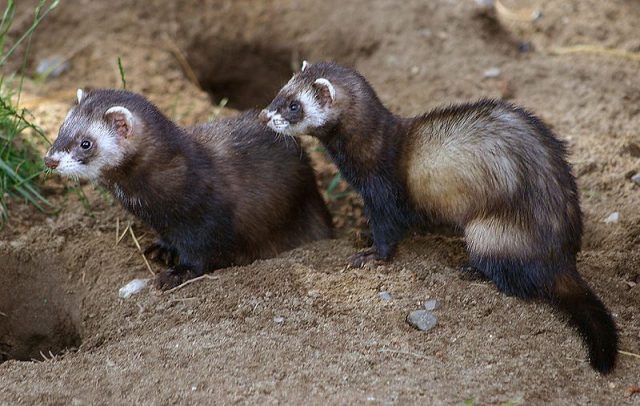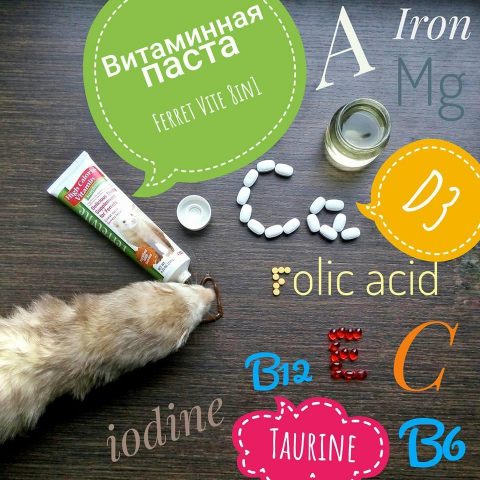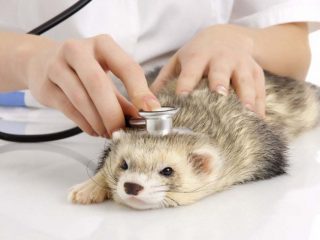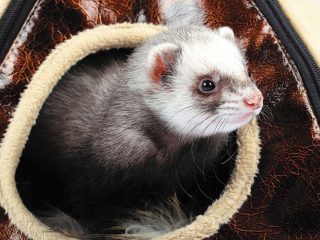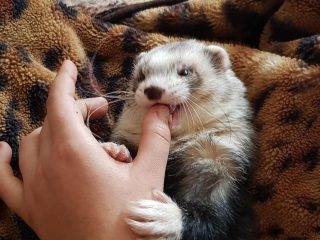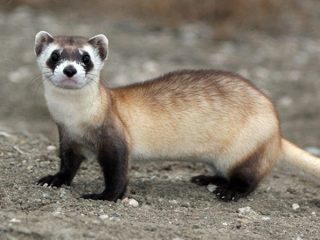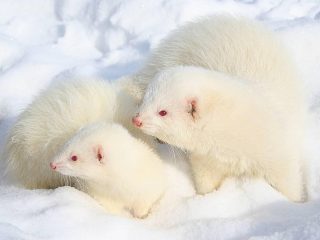Content
- 1 What do ferrets eat in the wild?
- 2 What do ferrets eat at home?
- 3 What can you feed your pet ferret?
- 4 What kind of dry food can you give your ferret?
- 5 How many times a day should you feed your ferret?
- 6 What vitamins should you give your ferret?
- 7 Features of feeding during molting and pregnancy
- 8 What not to feed ferrets
- 9 Conclusion
With their sweet appearance and restless character, ferrets have won the hearts of many animal lovers around the world and are among the top ten most popular pets. Those who are thinking about purchasing this wonderful animal are naturally interested in what to feed their ferret at home.
What do ferrets eat in the wild?
When creating a nutrition plan for a domestic ferret, it is worth keeping in mind that this animal is a predator by nature, and therefore a significant portion of its diet consists of meat. Under natural conditions, ferrets feed on a variety of small animals, mainly mice and rabbits. They do not disdain birds, frogs, worms, insects. Bird eggs and fish are also often eaten. But wild ferrets practically do not eat plant food, berries and fruits: it is poorly processed in their stomachs. However, such a diet seems unbalanced only at first glance.It is live protein food that contributes to the most complete development of these animals.
Ideally, a ferret's diet at home should be as close as possible to its diet in the wild. However, many owners fundamentally refuse this method of feeding animals for obvious reasons. Not everyone can calmly watch their pet happily crunch on cockroaches or kill a mouse. In addition, supplying such food fresh daily is problematic and not cheap. Luckily, there are alternative feeding methods that can help you raise a ferret that is healthy and happy.
What do ferrets eat at home?
Most ferret owners prefer to feed them specially prepared homemade food. This type of nutrition is much simpler and cheaper than the one described above, but requires compliance with certain nuances.
As already noted, the main food of wild ferrets is protein, which enters their body along with meat. Therefore, it is logical to assume that domestic ferrets also eat meat. But if you feed the animal only lamb or chicken, then its diet will be inadequate, and this, in turn, will negatively affect the animal’s well-being.
The fact is that although ferrets in the wild ignore plant foods, they get it from eating small animals. Along with meat, undigested food from its victims enters the ferret's stomach, which the body breaks down into carbohydrates, vitamins and minerals.
Store-bought meat is not able to provide the animal with the full range of nutrients. Therefore, the animal’s diet must be supplemented with other foods and vitamin supplements. If fed properly, your ferret will be playful and live a long life.Thanks to well-chosen food, the ferret's appearance will also change for the better: the fur will become fluffier and shiny, the teeth and claws will be strong, and the eyes will be mischievous and shining.
What can you feed your pet ferret?
When you decide to feed your ferret natural food, you should be very careful about what foods you can give to the animal, because an incorrectly selected diet can seriously harm the animal. Moreover, it is important to remember that some products in the daily diet are required, and some should be given out periodically and in strictly designated quantities.
Common list
Below is a list of what you can safely feed your ferret at home:
- various types of raw meat (beef, horse meat, veal, rabbit);
- raw poultry (chicken, turkey, duck, goose);
- porridge made from cereal flour (rice, buckwheat, oatmeal, millet);
- boiled vegetables, ground into puree (cauliflower, zucchini, broccoli).
Some foods should be given rationed. Among them:
- by-products from the named meat without films (liver, kidneys, stomachs, heart, lungs);
- boiled sea fish (trout, mackerel, horse mackerel, cod, flounder);
- fish and animal fat;
- cottage cheese;
- chicken and quail eggs.
Although domestic ferrets will happily eat any fish, not all types are suitable as food. Thus, river fish can cause a lack of vitamin B1 and worms, and varieties such as pollock, hake and blue whiting can cause anemia.
Unlike meat, fish to feed ferrets must be boiled and minced into minced meat with the head and bones in a meat grinder, since these parts are rich in vitamins and minerals.
Basic diet for a ferret
Since meat food accounts for the majority of a ferret's diet, it is worth paying due attention to its selection and processing:
- The chewing apparatus of ferrets is designed to cut up living flesh, and therefore the meat that ferrets eat at home must also be raw.
- Meat in its pure form should make up at least 50% of the animal’s daily menu.
- It is not recommended to boil meat, as cooking thickens the fiber structure, and it will be more difficult for the ferret’s delicate stomach to digest it. Feeding such a product can cause obstruction of the animal’s gastrointestinal tract.
- Store-bought meat must be fresh. Harmful microorganisms multiply very quickly in a stale product.
- Since ferrets have a fast metabolism, it is vital for them to have quickly digestible animal protein in their diet. It is best to feed your ferret chicken, duck, turkey, goose, beef, horse meat, veal and rabbit without bones or membranes.
- It is strictly not recommended to feed animals pork, lamb and any products made from this meat - it can cause obesity and heart disease in animals.
- You should not use store-bought minced meat to feed ferrets: it may contain impurities of pork meat. You can make minced meat yourself from the above types of meat by adding skin from cleaned poultry, trimmed clean fat and ground chicken wings and necks.
- Animal fat is essential in the diet of ferrets, so there is no need to specially remove it from the meat.
- Before feeding the ferret, meat by-products must be washed and the films removed from them. They should make up no more than 15% of the animal’s daily diet.
- It is not advisable to purchase meat and fillets in trays to feed ferrets, as they may contain preservatives that provoke allergies in animals. It is also better to avoid frozen meat, except for rabbit or turkey meat.
Clean water is the key to your pet’s health
An important aspect of a ferret’s nutrition is its drinking regime. Since these animals have an accelerated metabolism, they drink very often, 20 - 30 times a day. In this way, they are saved from overheating, since they do not have skin sweat glands and are not able to cool their body by sweating. Lack of moisture immediately affects the health of the animal, causing dehydration and heat stroke, and can lead to its death. In this regard, it is necessary to carefully ensure that the ferret always has free access to fresh, not too cold water.
What else can you give ferrets?
As noted earlier, a ferret's diet should not consist exclusively of meat, since it does not cover the animal's need for minerals and carbohydrates. To achieve balance in the animal’s diet, it is worthwhile to diversify feeding with other foods, but this must be done responsibly.
So, a ferret’s menu should include vegetables, but only those that contain a small amount of fiber. These include:
- cucumber;
- tomato;
- zucchini;
- radish;
- pumpkin;
- broccoli;
- cauliflower;
- Bell pepper.
Vegetables should be cut into small pieces or mashed into puree. The share of plant foods should not exceed 10% of the total food volume.
This figure also includes fruits.Ferrets love to eat sweet berries and fruits, such as:
- banana;
- mango;
- persimmon;
- apple;
- pear;
- watermelon;
- Strawberry wild-strawberry;
- currant;
- cherry, sweet cherry;
- gooseberry.
It is preferable to feed these products raw to ferrets in small pieces, after removing the peel from them, so that the animals do not become constipated. Dried, candied and canned fruits, as well as citrus fruits, grapes and raisins, avocado, pineapple and melon are not recommended due to the fact that they are toxic to the animal’s body.
Dairy products deserve special mention in the diet of ferrets. The structure of the digestive system of these animals does not allow them to process lactose, so milk in its pure form should never be given to animals, otherwise it will cause diarrhea. However, dairy products are important for replenishing calcium reserves and cannot be completely excluded when feeding. In particular, it is permissible to feed ferrets:
- cottage cheese;
- kefir 0 - 1%;
- Bio-ryazhenka.
All products must be low-fat, without sugar, flavorings and dyes. Feeding dairy products is necessary, dividing the product into small portions and only on the recommendation of a veterinarian.
Can a ferret have an egg?
You can also enrich the animal’s menu if you periodically feed it an egg. It contains a rich supply of vitamins B12, D and E, as well as fats that the ferret cannot get from meat in sufficient quantities.
However, ferrets can only be given raw quail eggs. A raw chicken egg contains the compound avidin, which in the animal’s body reacts with the substance biotin and destroys it. Biotin deficiency, in turn, leads to serious metabolic disorders in the animal.When an egg is boiled, avidin breaks down and the product becomes safe for the animal, but it is still worth removing the protein from it first so as not to provoke an allergic reaction.
Feeding a ferret with boiled yolk should be done no more than 1-2 times a week.
What kind of dry food can you give your ferret?
For those who, for some reason, cannot prepare natural food for their ferret every day or are not sure that the animal’s diet is composed correctly, feeding with specialized food is suitable. In Russia, for several years now, the supply of professional food for ferrets has been established, among which you can find products for every taste and budget. Similar feeds are represented on the market by several large companies:
- Padovan;
- Eagle Pack;
- Bosch Totally Ferret;
- Evo Dry Ferret Food.
Like other dry foods, ferret formulations are divided into 3 classes:
- Economy;
- Premium;
- Super Premium.
It is best to feed your ferret food of the last two classes - they are of higher quality, although they are more expensive. Economy-class food is often made from meat scraps, which are not nutritious: hence the low price.
The composition of the feed should not be ignored. For complete feeding, a ferret needs a menu of 35 - 40% protein, 20 - 22% fat and no more than 5% plant fiber. Dry food should not contain soy meat.
Finding the best dry food for ferrets is not an easy task. It all depends on the animal itself, so after feeding new food you should pay attention to the condition of the animal. The food is suitable for a ferret if:
- his coat is shiny and soft, the hairs do not split or break;
- healthy skin without redness;
- eyes clean and shining;
- it has no itching or inflammation;
- there is a good appetite;
- the animal’s belly is soft and rounded, and the ribs do not protrude;
- he has regular stools that are not too runny or too hard;
- The color of the stool does not have a strong odor or a yellow-green tint.
Can a ferret be fed cat food?
Before the advent of dry food lines designed specifically for ferrets, few owners of these animals fed their pets cat food. Although such feeding is still practiced today, such food should not be abused, since it does not meet the needs of the animals. Dry cat food typically has enough protein to keep your ferret thriving, but it is very low in fat. Those who decide to feed domestic ferrets in this way should opt for Premium food for kittens and pregnant cats with chicken or turkey, which maintains the ratio of nutrients necessary for the animal. To avoid nutritional deficiencies with this diet, you should additionally feed the ferret with boiled eggs or meat, and give vitamin supplements. It is not recommended to buy fish-based food.
How many times a day should you feed your ferret?
Unlike cats and dogs, feeding ferrets does not need to be done on a schedule, focusing on 1 - 2 meals.The ferret's fast metabolism and active lifestyle mean that the animal must constantly eat something in order to feel good. Therefore, there should always be some food in the bowl.
During the day, a ferret can eat from 7 to 10 times, and this does not depend on the time of day. If the diet is prepared correctly, you should allow him to eat whenever he wants, and not be afraid that the animal will get fat.
What vitamins should you give your ferret?
In order for ferrets to be properly cared for at home, it is necessary to ensure not only proper feeding of the animals, but also the right selection of vitamin supplements.
As with dry foods, there are vitamins designed specifically for ferrets. The largest manufacturer of such additives is considered to be the company “8 in 1”. This brand offers both general strengthening compositions and special preparations for the beauty and health of the coat.
The ferrets' body is not able to independently accumulate vitamins of groups B and C in the required quantities, so feeding the animals with vitamins must be carried out daily for 1 month, repeating the course 2 - 3 times throughout the year. However, this must be done if the animals eat natural products. Ferrets fed dry food receive all the important vitamins and minerals from it and do not need additional feeding.
Once or twice a year, you can feed the animals with fat-soluble vitamins A, D, E. Formulations containing them are usually produced in the form of oil solutions. It is important to strictly follow the dosage, adding 1 drop of the composition to the animal’s food every 2 days for a month. An excess of vitamins can cause poisoning.
Features of feeding during molting and pregnancy
An additional dose of vitamins is required for ferrets during molting, as well as for females during pregnancy and feeding their young.
Ferrets shed twice a year and usually last for 1 to 2 weeks. At this time, animals often feel discomfort and itch a lot, sometimes even interrupting their sleep because of this. Proper nutrition can make shedding less noticeable to the animal. To do this, when feeding, along with regular food, the ferret should be given vitamin preparations for fur with taurine. It is also necessary to remember that when a shedding ferret licks himself, particles of fur enter his body. To prevent clogging of the intestinal tract, it will be useful to add a special paste to food that will help the animal get rid of hair in the stomach.
The diet of pregnant females also requires additional vitamins and nutrients. First of all, you should increase the proportion of dairy products in the menu, which are a source of calcium necessary for the formation of bone tissue in future puppies. You can use a solution of kefir and calcium chloride, adding 3 ml per day to food.
The amount of fat in a pregnant female’s menu should also be increased. This can be achieved by feeding the animal egg yolk and fish oil 2 - 3 times a week.
Since females begin to shed on the 20th day of pregnancy, molting vitamins can also be given to the expectant mother. In addition, there are a number of vitamin complexes that will be useful for pregnant ferrets:
- Calcidee from "8 in 1";
- SA-37 (SA-37);
- Calcefit-7;
- Trivit;
- Tetravit.
What not to feed ferrets
Often, owners want to pamper their pet with a treat, however, if you give the animal just anything, this can be fraught with consequences. To keep your ferret healthy and active, the following foods should be excluded from the animal’s diet:
- all products containing sugar and salt;
- bakery products
- soy products and mushrooms;
- any hot dishes;
- pork and its by-products;
- lamb and offal;
- river fish;
- smoked meats;
- soups;
- fried foods;
- raw vegetables, potatoes, carrots, onions, garlic;
- spicy food;
- unground bones;
- unground cereals;
- milk, sour cream, kefir and yoghurts;
- nuts and dried fruits;
- dry dog food;
- chips, popcorn, cereals and flavored crackers.
Even in small quantities, such food can greatly harm a ferret’s body. Therefore, no matter how the animal asks for another tasty treat, you should refrain from feeding your pet prohibited foods. Instead, it is better to give the animal, for example, special drops for ferrets or a piece of banana.
Conclusion
Although it may seem that feeding a ferret at home is quite a hassle, if you follow the recommendations and show the animal due care, then all your efforts will pay off with the playfulness and healthy appearance of your pet.
